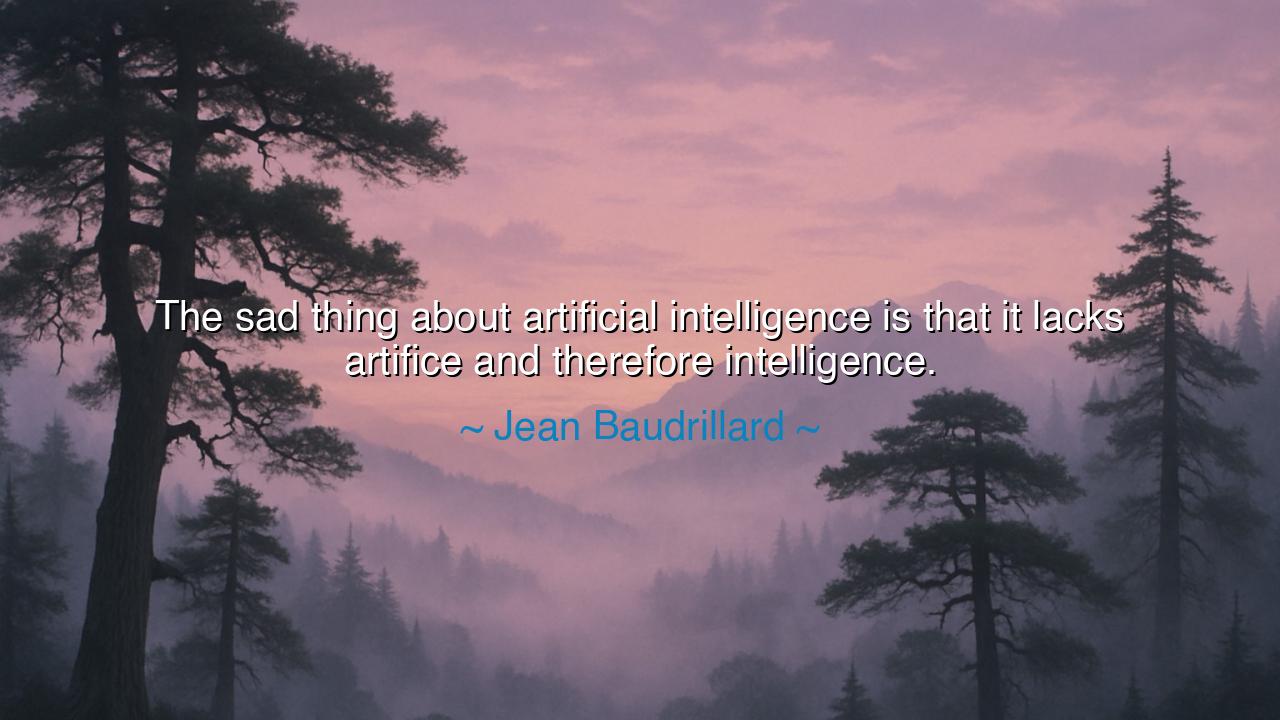
The sad thing about artificial intelligence is that it lacks
The sad thing about artificial intelligence is that it lacks artifice and therefore intelligence.






The Shadow of True Intelligence
In the mysterious and prophetic words of Jean Baudrillard, the philosopher of illusion and reality, we find this paradox: “The sad thing about artificial intelligence is that it lacks artifice and therefore intelligence.” It is a riddle wrapped in irony, as much a critique of machines as it is of humanity itself. For Baudrillard, who lived in an age intoxicated by simulation, the statement was not merely about technology—it was about the essence of intelligence, about what makes human thought alive, creative, and beautifully imperfect. He saw that true intelligence is not mechanical precision, but the subtle dance of imagination and artifice—the ability to dream, deceive, and create meaning beyond logic’s reach.
The meaning of this quote lies in the tension between artificial and authentic. To the philosopher, the tragedy of machines is not that they are cold, but that they are too pure—too direct, too literal, too lacking in mystery. For Baudrillard, artifice—that human gift of illusion, of storytelling, of invention—is the mark of consciousness itself. Intelligence, he reminds us, is not a straight line but a spiral; not a function of answers, but of ambiguity. A computer may calculate faster than any man, but it cannot dream. It may process information, but it cannot imagine its meaning. Thus, though we call it artificial intelligence, it is the absence of artifice—the lack of creative deceit and wonder—that makes it fall short of true wisdom.
This insight reflects the heart of Baudrillard’s philosophy: that the modern world is drowning in simulation—images that imitate life but are lifeless. He feared that as machines grew more intelligent, men would grow more mechanical, mistaking the imitation of thought for thought itself. His lament—“it lacks artifice”—is a defense of human complexity, of irony, contradiction, and art. For it is through illusion that we reveal truth; through paradox, that we glimpse wisdom. The gods of Greece did not speak in algorithms but in riddles. The prophets of every age taught not through data, but through symbol and story. To lack artifice, then, is to lack the divine spark that gives intelligence its soul.
Consider the tale of the painter Zeuxis, from ancient Greece. His rival, Parrhasius, challenged him to a contest of skill. Zeuxis painted grapes so lifelike that birds flew down to peck at them. Triumphant, he demanded to see Parrhasius’s work. His rival led him to a curtain. When Zeuxis reached to draw it aside, he discovered that the curtain itself was the painting. Parrhasius had deceived the master of illusion—and Zeuxis, laughing, admitted defeat. Here is artifice in its highest form: the lie that reveals a deeper truth. The machine could never make such art, for it cannot pretend. It cannot imagine the joy of being fooled, or the wisdom that lies in folly. It can only mimic, never mean.
Baudrillard saw the same danger in modern civilization. As we build machines to think for us, we risk forgetting the artistry of thought—that playfulness, that irony, that dance between truth and imagination. Intelligence, in its truest sense, is not the cold mastery of information, but the living rhythm of consciousness—the poetry of the mind that knows it is both real and unreal. The artifice he praises is not deception for its own sake, but the creative illusion that gives shape to existence. To strip intelligence of that art is to turn it into machinery, to reduce the mind to calculation and the soul to data.
Yet there is also hope in his warning. For if intelligence is defined by its artifice, then man must protect his capacity for creation. We must remember that our greatest power lies not in replicating the world, but in reimagining it. Let the machines compute, but let man dream. Let them solve, but let us wonder. The future belongs not to those who master algorithms, but to those who preserve imagination. For as long as we cherish the art of thought, intelligence will remain human, and humanity will remain divine.
Therefore, O seekers of wisdom in the age of machines, take this lesson to heart: do not trade imagination for precision. Do not let the perfection of technology blind you to the beauty of imperfection. Read poetry, create art, tell stories, and embrace paradox. For it is in these acts of glorious artifice that true intelligence breathes. Remember always that to be human is to dream beyond logic—to build illusions that reveal the truth. And if ever the machines grow wise enough to envy us, it will not be for our speed or strength, but for our artistry, for the secret fire of artifice that makes intelligence a mirror of the infinite.






AAdministratorAdministrator
Welcome, honored guests. Please leave a comment, we will respond soon